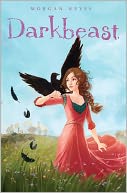Morgan Keyes: Writers Write (And Do A Lot Of Other Things)
Morgan Keyes is the author of the forthcoming middle-grade novel Darkbeast [Amazon | B&N | Mysterious Galaxy], which just sounds cool. Check out this setup from the description:
In Keara’s world, every child has a darkbeast—a creature that takes dark deeds and emotions like anger, pride, and rebellion. Keara’s darkbeast is Caw, a raven. Caw is her constant companion, and they are magically bound to each other until Keara’s 12th birthday. For on that day Keara must kill her darkbeast—that is the law. Refusing to kill a darkbeast is an offense to the gods, and such heresy is harshly punished by the feared Inquisitors.
I like this setup, and having read a little of Keyes’ stuff under her other name, I’m adding Darkbeast to my evergrowing wish list…
#
It’s become a cliche: Writers write. If we want to produce a novel, we need to put our butts in our chairs, our hands on our keyboards, and write.
Most people expand that hoary advice a bit: Writers read. If we want to know what’s going on in “our” genres, we need to read, early and often. We even need to read outside our genres, to get an idea of potential broader markets of readers, and to keep abreast of developing trends that might influence our own specific fields.
I’ve only recently realized how many other things that writers need to do.

I tried to sketch out story ideas, but nothing seemed fresh. I thought about branching out into new genres, but I felt utterly unprepared. I read background books for one new novel, researching a beloved public domain work that I intended to update as a modern story, only to realize (after a month of writing and several false starts) that the 19th century sentiment in that novel could not be translated into the sort of sassy, contemporary book I wanted to write.
In short, my creative well was empty.
And then, I attended the Silverdocs Documentary Film Festival. The festival included 114 films aired over seven days. I saw a fraction of them, “only” nineteen. They varied widely in style. One was as short as four minutes; several came in at right around two hours. They covered topics as varied as the manufacture of fortune cookies to the rock band Journey to migratory birds in Central Park.
And here’s the thing: each of those movies told a story. Each displayed unique characters in a specific setting solving carefully-defined problems. The documentaries were little gems of narrative. If they’d been books, they would have fallen into the genre of “creative non-fiction”, the novelistic exploration of narrow non-fiction topics, like Simon Garfield’s MAUVE, HOW ONE MAN INVENTED A COLOR THAT CHANGED THE WORLD or Trevor Corson’s THE SECRET LIFE OF LOBSTERS.
In fact, the documentaries weren’t merely lenses on another world. They were prisms. They shattered my preconceived notions, breaking my ideas into multiple component parts. After every movie, I engaged in long discussions about what the facts were, what they meant, how the filmmaker relayed them.
And somewhere along the way, I started to think of stories I wanted to tell. I began to imagine different types of narratives, building on the traditions of the fantasy genre that has long been my literary home, but different. I scribbled down notes for one story, and then another, and then another.
Viewing stories in a different medium than the one in which I regularly create allowed my “art” brain to relax. The films allowed the creative part of me to re-awaken, to begin exploring new boundaries.
Writers write. Writers read. And writers experience art wherever they can find it, in whatever format is available in the instant.
Do you agree? Disagree? If you’re a writer, have you found inspiration in other media? If you’re a reader, have you read works that were clearly inspired by other media?






Mishell Baker
July 9, 2012 @ 10:05 am
Inspiration can be found anywhere: not only in other arts (movies and music are big sources for me) but also just in living and experiencing life first-hand. The more a writer narrows his/her experience, the quicker that well dries up. One of the most creative times in my life was when I was working as an extra or “background actor” for film and television, because every day I was forced into a room with dozens if not hundreds of other people who had nothing to do but sit around and talk, revealing their eccentricities, obsessions, and myriad reasons for pursuing such an unusual line of work. Living the “writer’s life” isn’t always about writing more, or even reading more – it’s about keeping yourself open to new thoughts, new emotions, and new experiences, be that through listening to a torrid love ballad on the radio or to that shabby old lady on the bus.
I always say, writing every day is admirable, but first be sure you have something inside of you worth writing. Profound, entertaining, and/or transformative prose doesn’t emerge from a vaccuum; it comes from a sensitive human being’s interaction with the world and with other human beings.
Steve C
July 17, 2012 @ 6:36 am
I’ve read that a lot of poets draw imagery from paintings, and of course Keats himself wrote of the Elgin Marbles and that Grecian Urn.